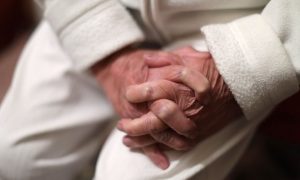Latest News
Notice of Southwark Carers AGM 2016 – 2017
The Annual General Meeting will be held at Walworth Methodist Church on the 31st March 2017 starting at 14.00 and is expected to last for two hours.
Formal details of the Agenda for the AGM, and postal and proxy voting information, will be sent to registered members during the week commencing 13th March 2017, after we receive completed nomination forms for elections to the Board and details of any special or other business that members would like to see discussed at the AGM.
If you have any other queries about the Southwark Carers AGM the please contact us on 020 7708 4497 and speak to a member of staff.

Pensioners becoming ill looking after loved ones, report reveals
Half of the UK’s carers over the age of 60 are struggling with health problems such as arthritis, heart problems and high blood pressure.
The report – findings Retirement on Hold – Supporting older carers by Carers Trust – highlights the battles some older people are now fighting as they save the taxpayers millions of pounds by caring for their relatives instead of dumping them on the State.
Many older people find the social care system too complicated to navigate while others, particularly women, cannot drive and have to rely on expensive taxis to take their husbands to medical appointments.
Gail Scott-Spicer, CEO of Carers Trust, said: “For the thousands of unpaid carers across the UK, there is no such thing as retirement.
“Instead, they are caring relentlessly, with many battling their own illnesses and frailty, with little or no practical and financial support.
“With more than 1.8mn unpaid carers over the age of 60 in England, and with a longer life expectancy, the older generation can expect to care for longer and later into their lives.
“Without more financial support for social care and help on a practical level, they can look forward to working harder without the perks of the job, such as annual leave and occupational health assessments.
“We need local authorities and society generally to think and plan ahead to meet the needs of the increasing numbers of older carers who are a vital resource to our stretched health and social care system.â€
According to the 2011 Census, there are 151,674 older carers between the ages of 80 and 84 and 87,346 over 85.

Retirement on hold for unpaid carers
For an ever increasing number of people, however, this dream falls flat when someone close to them has a long term illness, disability or is struggling with drugs and/or alcohol use.
Today Carers Trust launched a new report – Retirement on hold (PDF, 406KB) – supporting older carers. The report sets out the issues older carers told us they faced, and makes recommendations to ensure older carers get the vital support they need now and in the future.
Carers Trust are calling on local and central government to ensure the growing numbers of older carers are well supported and are considered a priority when planning services for the future; after all they have given up their well-earned retirement and are increasingly at the sharp end of the social care funding gap.
The growing population of older carers
It is widely recognised that we have an ageing population, people are living longer and often with multiple long term health conditions.
Alongside the growing numbers of older people with poor health, we have a growing population of older carers who are looking after them. The number of carers aged 85 and over grew by 128% in the last decade (Carers UK and Age UK, 2015).
As we get older we feel increasingly tired, and may develop our own age-related health problems.
Under normal circumstances we would slow down, take a rest in the afternoon, sleep late and generally take it easy. This is not possible for the growing numbers of older carers who say they are exhausted.
“When I was at work and was sick I could take time off and rest. That’s not possible now, I have to haul myself out of bed to take care of my mum.â€
“I have worked all my life, but this is the hardest job I have done. I never dreamt I would be doing these things for my wife. I want to do it but it I must admit it was a steep learning curve, I am 90 now and have had to learn new skills to care.â€
Campaigning for older carers
Over the past year, Carers Trust has been working to increase awareness of the issues faced by older carers, and campaigning to ask for a better deal for older carers when it comes to offering them vital support.
Carers Trust has run two successful actions as part of the campaign. The first action saw carers and supporters contact over 300 local councillors to ask for improved coordination of care services, to prevent them having to attend multiple appointments and make multiple phone calls.
In the second action, nearly 250 carers and supporters contacted their local Clinical Commissioning Group and Health and Wellbeing Board to ask for a better deal when it comes to carers’ health.
We must prioritise carers’ health
It is well recognised that caring is a risk factor when it comes to our own health. We must prioritise carers’ health, make it easier for them to take time out to attend appointments and keep up activities.
After all, if a carer is forced to stop caring because they are unwell, the person they care for is likely to need crisis or unplanned care, costing the health and social care systems time and money that could have been better used for prevention.

Don’t call it red tape: disabled people will miss EU protection when it’s gone
We have read the list of who will be hit hardest by Brexit – and boy is it long: young people who might want to live, work or study abroad; workers whose rights – and jobs – are threatened at home; and the poor, who will pay the price for Philip Hammond’s post-Brexit “new economic modelâ€.
But while the plight of everyone from farmers to financiers has received massive publicity, a more vulnerable group massively threatened by Brexit have rarely been mentioned:Â the disabled.
Disabled people know how it feels to be left behind – it has taken years of struggle to get to where we are today. Yet to say that the voices of prominent disabled people were drowned out during the referendum campaign when we warned against Brexit, doesn’t come close. Only crude messages of division were broadcast. So no one heard when we asked what would happen to the severely disabled if free movement for thousands of personal carers from the EU was curtailed.
As someone suffering from muscular dystrophy, there are a thousand aspects of the everyday world which significantly affect me. The red tape that many complain about, the legion of EU directives, are often things which have made life so much better for disabled people. They often ensure that everything from products to leisure facilities are disability-friendly, that public transport is accessible, that jobs in the public sector are open to disabled people, and that there is equal access to education.
Who knew Brexit might mean that these fundamentally important rights would have to be won all over again? Or will they be negotiated at all?
There is now terrible uncertainty. The government has failed to confirm that working people from the EU who have settled in this country will be welcome to stay after Brexit; Liam Fox is using them as pawns in a hostage negotiation. This is perhaps the greatest worry for many disabled people, as they are now used to the high standards and good attitudes of EU care workers who dominate the sector.
We know ministers are not going to give EU migrants here the right to remain unless there is reciprocity. There has been long-standing provision to coordinate social security schemes for people moving within the EU and European Economic Area (EEA) – a vital protection for disabled people who reside in other EU or EEA member states.
These coordination rules are there to support free movement, and include allowing a person’s contributions paid in one country to count towards their entitlement to benefit in another, or allowing certain benefits to be taken abroad with them. What will happen in years to come? What about those who have lived and worked in more than one member state and paid national insurance in those countries? At present a person who moves from one EU country to another has access to benefits in the host country if they are economically active or can support themselves. Working EU and EEA migrants are entitled to in-work benefits on the same basis as nationals of the host country.
But this could all change after Brexit.
There are almost a million UK nationals resident in other member states. If there is no certainty for months, many UK nationals living abroad – who may well be elderly and disabled – are likely to return to the UK, where they may need care services and quite possibly supported housing, thus increasing the strain on services.
And soon we face the great repeal bill, which will annul the 1972 European Communities Act and transpose all EU law into domestic law, wherever practical. The difficulty comes when the government decides which laws will be scrapped altogether. The wretched “red tape challenge†does not give us any confidence. This was the idea that many regulations were unnecessarily burdensome on business so must be scrapped – but it didn’t seem to matter that their disappearance might make life more difficult for disabled people.
We have reason to be concerned about losing many hard-won rights – enshrined in product design, air and rail travel, employment, building accessibility, public website accessibility, and many other areas. I don’t know how I would cope, for instance, without my blue badge – a European initiative that enables disabled people to park, and which is valid across Europe, and other things we now take for granted: help for disabled people on planes, special lanes for wheelchair users on Eurostar, accessible hotel rooms. The government must assure us that disabled people will be in the forefront of negotiations on any matter which affects them directly.
Demanding equal treatment in the NHS – this, for Brexiteers, is presumably “red tapeâ€. The EU has made the lives of millions of disabled people easier and fairer. I am proud that the Liberal Democrats, alone among UK-wide parties, are fighting to protect disabled rights by demanding the people have a say on the final deal before the Tories embark on a ruinous hard Brexit.

Conservative minister pledges new strategy to help children of alcoholics
Nicola Blackwood, the public health minister, praised Ashworth for speaking out, along with Labour former minister Liam Byrne, about their experiences of growing up with an alcoholic parent.
“I hope each member who has spoken today will continue to work with me as we fight to tackle this social injustice,†she said, promising to sit down with MPs to draw up a strategy for tackling the problem.
Ashworth spoke in the debate after talking for the first time about his father’s alcoholism in an interview with the Guardian.
He told MPs: “I am the child of an alcoholic. Throughout my life, I was an only child, in the week I would live with my mum and at the weekends I would live with my dad and my dad would spend the whole weekend drunk.
“From the age of eight or so going to my dad’s meant I was effectively the carer. It was very typical for my dad to pick me up from school and literally fall over because he was so drunk.â€
Ashworth recalled having to phone a taxi because his dad could not make the short walk up a street and coming home to find a fridge full of bottles of white wine. He also spoke about the pain of watching his father play in goal in a football match and his workmates shouting: “Jon Ash is in goal, all you have to do is throw a can of Stella and he’ll go for that rather than the ball.â€
The shadow health secretary added: “My biggest regret in life is that my dad moved to Thailand when he was about 59. That was that, he just went. Six months later I got married and he promised me he would come to the wedding and the day before he phoned and said he was not coming.
“I was so angry I could hardly speak to him. I wanted him to meet my new wife and meet my new family. A few months later he was dead. I had to go to Thailand to get the body and deal with the funeral.
“The friends he had met over there told me he was drinking a bottle of whisky a day. They told me he couldn’t come to the wedding because he didn’t want to embarrass me.
“We were a working class family from Salford and I had gone to university and become a politician. Posh people would be at the wedding and he felt he would embarrass me by being there. I will always regret that.â€
Byrne, the chair of the all-party group of children of alcoholics, said Blackwood’s promise of a government strategy was a breakthrough.
“For over a year we’ve tried to make sure that the voices of children of alcoholics are heard in parliament making the case for change,†he said. “Now the government has listened. The government has agreed to sit down and hammer out a plan. Crucially ministers have agreed with our number one goal: no child of an alcoholic should ever feel alone.â€

Robots could help solve social care crisis, say academics
An international team is working on a £2m project to develop versatile robots to help look after older people in care homes or sheltered accommodation.
The robots will offer support with everyday tasks, like taking tablets, as well as offering companionship.
Academics say they could alleviate pressures on care homes and hospitals.
Researchers from Middlesex University and the University of Bedfordshire will assist in building personal social robots, known as Pepper Robots, which can be pre-programmed to suit the person they are helping.
Playing games
It is hoped culturally sensitive robots will be developed within three years. The programme is being funded by the EU and the Japanese government.
Prof Irena Papadopoulos, expert in trans-cultural nursing, said: “As people live longer, health systems are put under increasing pressure.
“In the UK alone, 15,000 people are over 100 years of age and this figure will only increase.
“Assistive, intelligent robots for older people could relieve pressures in hospitals and care homes as well as improving care delivery at home and promoting independent living for the elderly.
“It is not a question of replacing human support but enhancing and complementing existing care.”
She added: “We are starting with care homes and with people who are semi-independent living in sheltered housing, but we do believe that in the future the robots would become acceptable for people to have in their own homes.”
Well-being
Pepper Robots are manufactured by Softbank Robotics and already used in thousands of homes in Japan.
Amit Humar Pandey, the company’s chief scientist, said the firm wanted to create a world where robots co-exist with humans in harmony, for a smarter, healthier, safer and happier life.
It is hoped the new robots will help improve the well-being of their charges by providing entertainment and enabling them to connect better, through smart appliances, with family and the outside world.
They will communicate through speech and with gestures, be able to move independently and pick up signs the elderly person is unwell or in pain.
Similar robots are already being used in hospitals in Japan to perform tasks such as lifting patients and serving food
In the final year of the project, the robots will be tested at Advinia Healthcare care homes in the UK.
The company’s executive chairman Dr Sanjeev Kanoria said it was keen to revolutionise the care of the elderly by supporting hard-working care staff.
“Robots can support care workers by helping to reduce errors in medication and assisting them with advanced technology to help vulnerable residents, live safer independent lives in care homes and at home.”

Councils may cut social care provision due to underfunding, LGA says
Older and vulnerable people could stop receiving vital help to get out of bed, washed and dressed, because the underfunding of social care has become so severe, councils have warned.
Leaders of 370 local authorities in England and Wales fear that some councils are finding it so hard to provide the right level of support they could face a high court legal challenge for breaking the law.
The Local Government Association said care visits could become shorter, carers could face greater strain and more people could be trapped in hospitals, making NHS services even busier as a result. The LGA estimates that there will be a £2.6bn gap by 2020 between the amount of money social care services need and their budgets.
Cllr Izzi Seccombe, the chair of the LGA community wellbeing board, said: “The intentions and the spirit of the [2014] Care Act that aims to help people to live well and independently are in grave danger of falling apart and failing, unless new finding is announced by government for adult social care.â€
The act, which came into effect in 2015, was intended to ensure that councils provided help with basic everyday tasks to anyone who was struggling to undertake at least one of them on their own, because of a physical or mental impairment. But the purpose of the legislation is at risk because councils cannot afford to meet demand, the LGA told the Treasury in its submission ahead of the budget in March.
Only 8% of council directors of adult social care said they were confident that they could fulfil their full duties under the act in 2017-18.
Barbara Keeley, the shadow social care minister, said: “It is deeply worrying that councils are now having to spell out the risks that this lack of funding is causing. We should not tolerate the fact that growing levels of basic needs are going unmet, care visits are shorter and there is increased strain on unpaid family carers.â€
A government spokesman said: “Local authorities have a duty to implement new rights introduced in the [2014] Care Act and while many are already providing high-quality social care services, we will continue to challenge and support those not currently doing so.
“We have provided councils up to £7.6bn of dedicated funding for social care over the course of this parliament, significant investment to ensure that vulnerable people get affordable and dignified care as our population ages.â€

Health tourism is NOT bad – but what you’re being told about it is
Conjure up a picture of your local hospital. Now imagine a woman dying in childbirth on its steps, with the doors closed to her.
See in your mind’s eye a child knocked down by a truck, their bones shattered into gravel, bleeding to death in reception while doctors are held back by accountants.
Not on, is it? Not in the land of the NHS.
But what if they’re foreign?
Today we have the case of Pricilla, pictured above, a Nigerian lady decried as a health tourist across the pages of newspapers after racking up a £500,000 bill for having quads in a London hospital.
She came here while six months pregnant! Her brats cost thousands to keep in incubators! She’s too poor to pay! Bang the table, growl, shake your head.
Except that’s not quite the full story – or, indeed, anywhere near an explanation.
Pricilla, a nurse, underwent IVF at home in Nigeria, where the procedure can cost as little as £260. It’s not the same indicator of wealth as it is here.
She conceived quadruplets and her doctor advised her to have them abroad, as mothers in Nigeria have a 1 in 13 chance of dying in childbirth. In the UK it’s 1 in 7,000.
Pricilla could have arrived on a tourist visa and presented at A&E for free emergency treatment. She chose instead to go to the USA where she has family.
She boarded a plane at around 24 weeks pregnant, within the recommended limits for travel by women with multiple pregnancies.
Her only crime by this point was to be a 43-year-old who needed help to conceive. But then she landed in Chicago.
Despite there being no legal requirement for health insurance to travel to the USA, and despite her having a valid visa, the authorities said unless she had the resources to pay for medical care she had to leave.
With the cost of a twin birth being roughly £80,000 in the USA and quads far more, Pricilla couldn’t give that assurance.
Ignoring their legal duty to provide emergency medical care until patients are stabilised, regardless of the ability to pay, the authorities put Pricilla on a plane back to Nigeria.
If that seems particularly cruel of America, well, they also charged us £21billion for helping out in World War 2 and were still taking the cash until 2006. Superpowers aren’t necessarily nice people.
So there was Pricilla, pregnant with four babies it was probably going to kill her to deliver, on a plane home after a stressful to-do with Uncle Sam, and she went into early labour.
The flight the US had put her on was going via London, so once it landed cabin crew called an ambulance and off she went to hospital where the NHS gave her the same care it’d give to any of us.
One baby died soon after birth and another, named Deborah, died this weekend. The remaining two, called Elijah and Esther, are in neonatal intensive care where they are fighting for life.
Their story featured in a BBC documentary which showed hospital bean counters worrying about the bill, which had topped £500,000 including £20,000 a week for each baby in an incubator.
I had a baby last year. I was rushed to theatre for a forceps delivery, helped by a dozen medical professionals, and have since had prescriptions, GP and health visitor appointments. I’ve paid all my taxes since I was 18 but I’ve no idea how much it all costs, and I don’t know if I’ve paid in enough to cover it.
But the NHS has never billed me, or asked me about my tax band: they just helped because they could. And they did the same for Pricilla.
The alternative was her delivering four probably-dead babies in an airport terminal. That would be a gruesome, shabby, barbaric thing, akin to a newspaper reporting the death of two newborns by screaming their foreign mother should pay for it.
Pricilla did not break a single rule or steal any advantage from us. And it didn’t really cost us£500,000.
In 2015 the Tories changed the rules so that anyone from outside Europe had to pay 150% of the cost of their treatment, so £166,666 of that bill is entirely in the mind of David Cameron.
The truth is that Pricilla didn’t want to come here, didn’t plan to come here, didn’t rack up the bill she’s been presented with and didn’t have any alternative. But yet she’s described as a ‘health tourist’ as though she picked the NHS out of a Thomson brochure and wanted to visit Buckingham Palace on her way home.
Despite the NHS being 70 years old, health tourism became a scandal only after 2010. And almost all the claims about the price are estimates.
The costs of people who deliberately arrive in Britain with the intention of being treated by the NHS has been put at anywhere between £110m and £280m.
Sound like a lot? The larger figure represents just 0.24% of the annual NHS budget. Missed GP appointments cost us about the same, and they’re OUR fault.
Despite repeated calls for them to be selective about who they treat, our doctors and nurses insist their job is to care rather than judge.
If you say a foreigner can’t have care they didn’t pay taxes for, then nor can a stay-at-home mum. A minimum-wage shiftworker gets second-class treatment and Richard Branson gets all the bells and whistles.
Hardly fair, and hardly what the NHS was ever intended to do.
But yet that’s how we’re encouraged to think – that some people are more deserving than others, and the ones who deserve the least are foreigners.
European hospitals can reclaim the cost of our care from our government, while some other nations have reciprocal agreements. The deals all differ: for example in the Turks and Caicos you get a free ambulance only on the main island, and in New Zealand all that’s free is dental care. In Gibraltar you have to pay for home visits and in the British Virgin Islands you’ll get free treatment only if you’re over 70.
All the countries of Africa, south America, Asia and the Pacific demand we pay for everything. And if we visited, or got ill while changing planes, they’d be within their rights to let us die on the doorstep just like we didn’t do with Pricilla.
And if they did that, you can bet your bottom dollar there’d be keyboard warriors and tabloid front pages screaming about “primitive” care. They’d probably all be nicer about two dead babies as well.
Treating Pricilla cost us no more than treating one of us. We waste more every day by abusing the NHS than we spent on her. Yet it’s Priscilla we’re told to worry about.
While you’re worrying about her, you’re not worrying about why health tourism is suddenly a thing. You’re not asking yourself why it’s fine for you to get free care you might not have paid for, but not them. You’re not counting up the sums and figuring out the only way the Tories can stop the NHS being free is if you help them.
You’re especially not thinking about whether it’s worth getting het up about: although about 40% of those invoiced by the NHS repay some or all of the costs, the Department of Health says it could cost £18m to recover £15m in unpaid bills.
Once they get you to agree to restrict it for foreigners, you’ll restrict it for young lads who get drunk and fall over. Then you’ll restrict it for diabetics who didn’t eat properly, for epileptics who don’t wrap themselves in mattresses and for people who trip down the stairs.
Once you insist every traveller has to have health insurance, you’ll need the same. And then cancer will be something that you need to be rich to survive.
If you start down that road then eventually you’ll restrict the NHS for yourself. And you’ll be told to pay through the nose in every country, including your own.
Far better not to get angry about Pricilla, who’s stuck in a hostel while her surviving babies struggle to breathe.
Far better to compare the costs, and keep your GP appointments.
Far better to hope Pricilla shows the rest of the world why they should all have a NHS too, and that maybe one day it will be found everywhere, with everyone paying what they can and taking what they need.
The NHS is the best, fairest and most decent way of looking after ourselves. The more of us that see that, the more will demand it, and the more we will get it – here and abroad.
Then perhaps we can have proper health tourism. What’s not to like about that?

Patient participation in procuring audiology services
We are looking for two patient representatives to sit on the procurement panel to help us evaluate the submissions. The panel will take place on Friday 10 February, 09.30 to 17.00, at 160 Tooley Street,SE1 2QH. We expect that you will need to contribute nine hours of your time (seven at the panel and two hours reading) and we will pay a user incentive of £20 per session (half a day).
We are looking for people who are frequent users of audiology services in Southwark and Lambeth and have used the service in the last year.
If you are interested or would like some more information, please contact Pam Rogers, 020 7525 3590 Head of Demand Management.

Young Carers Awareness Day 2017
Young carers often help with tasks around the home, such as cooking, cleaning, or helping someone to get dressed and move around. Caring for someone may require a lot of physical help, such as helping a disabled relative, though it can also involve providing emotional support for the relative and other family members too. All of this care is often provided while the young person is still in education. Being a young carer can, therefore, impact your life in a huge way.
Impacts of caring
Some people start caring at a very young age. When this is the case, the young person often doesn’t realise they are a carer, particularly if it is something they have always known. On the other hand, some young people become carers overnight – for instance, if a relative has a dramatic or sudden change in their health.
Often, young people are happy to accept the responsibility of caring for parents or relatives – and it can be a positive experience; young carers can learn many useful life skills, with the satisfaction of taking care of someone they love. But, caring for someone else often brings with it huge pressures – especially when, as a child, you’re at an age when the norm is for someone to look after you.
Stress
Many young carers struggle to cope with all of the pressures on them and are often afraid to ask for help. In addition to the usual pressures of school and growing up, young carers are faced with worries about money, the future and, of course, their families.
School
Many young carers struggle educationally – struggling with the pressures of completing work outside of school hours or even to concentrate fully whilst in class. In a survey, 39% of young carers said nobody in their school was aware of their caring role.
Work and finance
Affording basic needs or having enough money to socialise with friends are amongst some of the main financial worries of young carers. Being a young carer can mean that you don’t have enough time or energy to work, whether full-time after you’ve left school, or part-time whilst still in education.
Social
With many adult responsibilities placed on them, young carers often lack the opportunity to have a ‘normal’ social life, and their social experiences will usually differ to those the same age as them. Many children can become socially isolated, often having no awareness of, or contact to, other young people in a similar situation to themselves.
Young carers’ rights
According to Government policy, children should not be expected to perform the same care role as an adult, and adults should not solely rely on children to provide their care. However, this is not always possible in reality. Being a young carer can have a big impact on how a child grows up. Many young carers struggle to balance being a carer with going to school, having a social life, and taking care of themselves.
In order to prevent this as much as possible, the Government has introduced new rights for carers and their families. In April 2015 two new pieces of legislation came into effect, giving new rights to care and support for young carers, young adult carers, and their families. These laws are called the Children and Families Act 2014, and the Care Act 2014.
As part of the change in law, a social worker from your local authority must visit to carry out a Young Carers’ Needs Assessment to decide what kind of help you and your family might need – at a young carer’s request, or request of their parents. This assessment will decide whether it is appropriate for you to care for someone else – including whether or not you want to be a carer. The local authority must also look at your education, training, leisure opportunities and your views about your future.
What support is available to young carers?
If you start to feel that the impacts of being a young carer are affecting your mental or physical health, it’s important to reach out and seek help. Your individual assessment is the best place to find out about what support is available in your situation, but we will discuss some ideas that might be suitable for you.
Counselling for young carers
Caring for someone can be an isolating job, whatever your age – but, while you may sometimes feel this way, you’re not alone. Other people care about your safety and well-being, and there are many options you can turn to if you need to talk.
Counselling may be an option. Speaking to a qualified counsellor can help ease the pressure as they will often recognise the highs and lows of your role as a young carer. Opening up to a professional can give you the chance to talk in a safe, non-judgemental environment.
If you are ready to talk, but feel unsure of the next steps, you may benefit from speaking to a family member, teacher, GP or social worker. If they believe counselling may be right for you, they can help you start this journey.
Other types of support
If you’re finding it difficult to balance being a carer with school or having a social life, but you’re not ready to contact a counsellor, there are many other places you can look to for support:
- Your school and teachers
If you’ve been missing lessons to look after someone, or you’re struggling to concentrate when you’re in class, talk to a teacher you trust. Your school might be able to alter your timetable, give you extra time and support to complete school work, or even provide a quiet environment for you if you find yourself struggling. But, if your teachers aren’t aware of your situation, they won’t be able to help you.
- Government funding
If you’re 16 or over and no longer in full-time education, you may be entitled to help with your family’s finances, for instance, through benefits such as Carer’s Allowance. To find out more details about what financial support is available, contact our whole family support service on 020 7708 4997.
- Children’s charities
Charities such as Barnardo’s, Action for Children, Family Action, The Honeypot Children’s Charity provide many services for young carers and their families. Whether you’re looking for a respite break, local carers groups to attend, or general help, advice and emotional support – children’s charities have much to offer.
- Carers’ organisations
Some carers’ organisations have set up online communities as an extra form of support if local groups are not convenient, or local to you. One example is Babble, set up by Carers Trust – an online space that provides a safe place for young carers to chat, share their experiences and to access information and advice.
